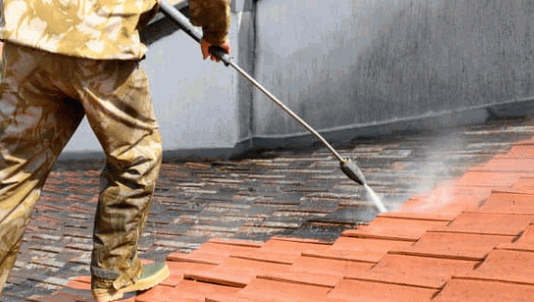
Maintaining the appearance and condition of your roof is a hugely important task for property owners. Even if your roof tiles are out of sight, you cannot allow their maintenance to get out of mind. A well-maintained roof saves money, earns you money, and ensures you have fewer things to worry about. Poorly maintained roof results in the opposite outcomes and can be very costly for home and business owners.
With most people looking for a fast and effective way to clean their roof and roof tiles, natural pressure washing is an option. This cleaning method is hugely effective on patios, decking, and many areas around the home, but does it work for roof tiles and your roof structure?
The Uniwash Team is here to address if pressure washer cleaning damages roof tiles, ensuring you have all the information you need to make an informed decision on how to best care for your property.
Simon Cripwell was a spokesman for Warwickshire Trading Standards, and he said, “Roofing experts warn that roof tiles should not be subject to high-pressure washing. To do so can potentially damage or break the tiles and remove any aesthetic granular tile finish. Also, pressure washing can also force water between the tile and roofing felt, spraying water in to the roof space or loft.”
This statement from a trusted body in the United Kingdom highlights the risk of breaking tiles, removing aesthetic finishes, and the potential for flooding a loft space or home. There are obvious risks associated with pressure cleaning solutions, especially on roof tiles.
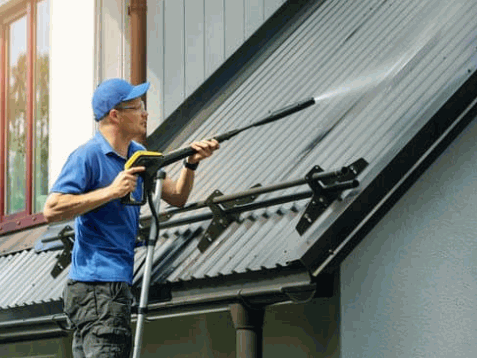
At Uniwash Team, we prioritise your roof's long-term health and integrity. As roof maintenance and care specialists, we understand the importance of using the right methods to keep a roof clean, preserving the beauty and functionality of your home's most vital asset.
Here are five compelling reasons why pressure washing your roof can be detrimental and provide alternative solutions for maintaining its pristine condition.
Roof shingles shield your home from the elements and provide an aesthetically pleasing appearance. However, subjecting them to extreme-pressure water can cause irreversible damage.
The intense force generated by pressure washers can dislodge shingle granules, leading to premature deterioration, reduced lifespan, and compromised waterproofing capabilities. Instead of resorting to pressure washer solutions, we recommend using gentle cleaning techniques that remove dirt and debris without causing harm.
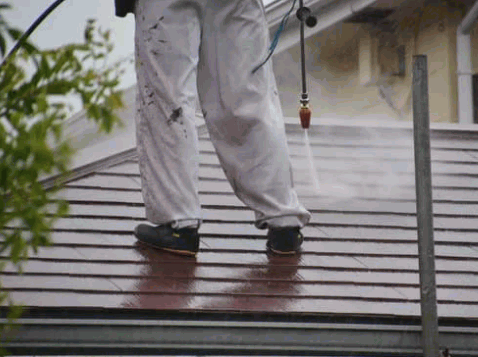
Good quality roofing systems prevent water intrusion and safeguard your home's interior. However, this form of washing can compromise this crucial barrier. This water can penetrate beneath the shingles, forcing its way through vulnerable areas such as cracks, gaps, or improperly sealed flashings.
This can result in leaks, water damage, and costly repairs. It is important to clean roof tiles, especially clay roof tiles, but if the roof cleaning service compromises your roof tile, it isn't worth the effort. When you pressure wash your roof, it shouldn't cause more problems or lead to more costs.
Your roof plays a vital role in regulating your home's temperature and energy efficiency. You risk damaging the reflective properties of your roof's surface by using a pressure washer., as well as your loft insulation.
Removing protective coatings, such as UV-reflective granules, can increase heat absorption, resulting in higher energy consumption for cooling purposes.
Opting for gentle cleaning methods preserves the energy efficiency of your roof and helps you reduce your carbon footprint. Our post "Why Pressure Wash Your Driveway" maybe interest you. You can check it out.
Pressure washers operate at high velocities and can be challenging to control, especially when working from elevated positions. The risk of personal injury is significantly increased when attempting to pressure wash a roof, as slippery surfaces combined with powerful water streams create hazardous conditions.
Additionally, the forceful water can dislodge loose or brittle roof components, such as flashing or vents, potentially causing damage to your property. Prioritising safety and avoiding pressure washing mitigate these risks.
Pressure washing can have detrimental effects on the environment. The powerful water streams and cleaning solutions can wash away into storm drains and pollute local waterways.
These contaminants can harm aquatic ecosystems and pose a risk to the environment. By adopting alternative roof cleaning methods that utilise environmentally friendly products and techniques, you contribute to preserving our natural resources. For more learnings, you can check out our post "Can You Pressure Wash Indian Sandstone".
With many industry experts, bodies, and roofing contractors raising concerns about power washing a roof, it is helpful to acknowledge more dependable alternative offerings for roof cleaning.
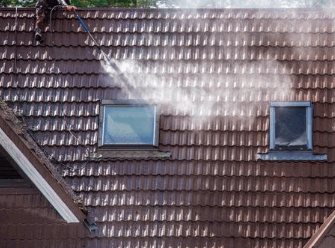
Soft washing is a gentle and effective method that uses low-pressure water combined with eco-friendly cleaning solutions to remove dirt, algae, moss, and other contaminants from your roof. This technique is safe for various roofing materials and helps restore the roof's appearance without causing any damage.
For smaller areas or localised stains, manually brushing and scrubbing the roof surface can be an effective alternative. You can gently remove debris and stains without needing high-pressure water using a soft-bristle brush or a non-abrasive scrub pad.
Applying specialist roof cleaning chemicals can help break down and remove stubborn stains, algae, or moss growth on your roof. These chemicals are safe for your roof while effectively eliminating organic matter. Following the manufacturer's instructions and using appropriate safety precautions when using chemical treatments is essential.
Using a roof broom or blower is a practical way to remove loose debris, leaves, or branches from your roof. This method allows you to maintain a clean roof surface without water or high-powered pressure washer equipment.
While there are some concerns over these methods, relating to safety at working at a height or in the use of chemicals, these options represent alternatives that many specialists prefer over using a pressure washer on a roof.
Soft wash solutions are prevalent, offering an optimal way to remove moss, algae, and other dirt without placing roof tiles in danger.
No, it is generally not recommended to jet or power wash a tiled roof. Pressure or jet washing can cause significant damage to the tiles, especially if they are older or in a fragile condition.
The forceful water pressure can dislodge or break tiles, leading to leaks, cracks, or other structural issues. Additionally, this method can strip away protective coatings or granules on the tiles, reducing their lifespan and compromising their ability to repel water.
There are several ways to clean the moss from roof tiles. Manual removal involves using a soft-bristle brush or scrub pad to scrub away the moss gently. Chemical treatments with roof moss-killing solutions containing copper sulphate or zinc compounds are helpful but always follow tile manufacturers' guidelines when applying this solution.
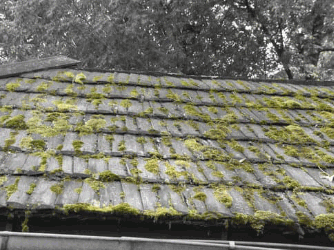
When removing moss from a roof, it is best to do so when it is dry. Working on a dry surface provides better control and reduces the chances of slipping. Wet moss can be slippery and may cause accidents. It is also advisable to wait for the roof to dry before removing moss to prevent spreading moss spores to other areas, which can lead to regrowth.
Check the weather forecast and choose a dry day for the cleaning process. Prioritise safety, wear appropriate footwear, and exercise caution to avoid accidents or damage. If you need more clarification or are uncomfortable with the work, consider hiring roofing contractors, as they have the expertise and equipment to remove moss while minimising the risks involved safely.
Bleach can damage roof tiles due to its harsh chemical composition. The concentrated nature of bleach can lead to discolouration, degradation, and weakening of the tiles over time. The extent of the damage can vary depending on the type and age of the roof tiles, with porous or older tiles being more vulnerable. Prolonged or repeated exposure to bleach can further accelerate the deterioration process.
Well-maintained roof tiles keep your roof in excellent condition and your loved ones safe. As you’ll see, there are better options than pressure washing roofs, and if you need any guidance on this matter or advice on how to enjoy the best professionally cleaned roof, contact the Uniwash Team for more support.
While you're here, take a look at our posts on what is industrial cleaning and how to clean external cladding for more additional information.